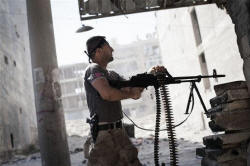LDN - Other News
 |
|
|
 WHY IT MATTERS: WHY IT MATTERS:
Syria
 Send a link to a friend
Send a link to a friend
[September 27, 2012]
TOLEDO, Ohio (AP) --
The issue:
Syria's conflict is the most violent to emerge from last year's Arab Spring. The protests started peacefully but prompted a brutal crackdown by President Bashar Assad's government. The fighting has escalated into a civil war that has killed just over 30,000 people over the last year and a half, according to activists. Despite intervening in Libya, the United States has steered clear of taking military action or arming Syria's rebels.
|
|
 Where they stand: Where they stand:
President Barack Obama called for Assad to step down more than a year ago and has sought consensus for a diplomatic power-transfer plan. He has been stymied by Russia and China, which have blocked efforts at the United Nations to end the Assad government. He has been unable to prevent a worsening civil war between Assad's forces and the rebels but remains opposed to using U.S. air power to prevent Syrian jets from flying and is against directly providing weapons to the opposition. His administration says such plans would further militarize Syria. Instead, it hopes better coordination among the opposition will help unify the country against Assad.

Romney has demanded "more assertive" tactics to end the Assad government, accusing Obama of a "lack of leadership." The Republican challenger has been vague on specifics. He says the U.S. should cooperate with partners to arm Syria's rebels. That stops short of calling for direct U.S. weapons deliveries and is a policy the Obama administration has adopted in limited fashion for several months. Romney also has spoken of possibly sending American troops into Syria if weapons of mass destruction are unprotected
-- going slightly further than Obama, who calls WMD his "red line" in the conflict. And Romney wants more U.S. pressure on Moscow to break the diplomatic logjam.
Why it matters:
The Arab world's efforts to achieve stable democracies could hinge on Syria. Demonstrators ended dictatorships in Tunisia and Egypt, a U.S.-led mission helped defeat Moammar Gadhafi in Libya and a transition deal brought change to Yemen. But the four-decade-long Assad government has dug in. It is accused of torture and mass killings. And if it succeeds in keeping power, reform-wary leaders across the region could take it as a lesson that they can attack their own citizens and get away with it.
| | | |
[to top of second column]
 Syria's close alliance with Iran is important. Assad has facilitated Iran's assistance to militant groups Hamas and Hezbollah, destabilizing Lebanon while threatening Israel's security and American interests in the Middle East. The U.S. accuses Iran of managing Syria's repression to prop up its faltering ally. With Washington and Tehran competing for influence in the Arab world, change toward a more U.S.-friendly government in Syria would be a major strategic victory. Up to now, the only governments ousted in the Arab Spring were either U.S. allies or counterterrorism partners.
For Obama, Assad's perseverance also poses a credibility problem. The president has demanded that Assad leave but has ruled out several elements of American power to make that happen. He has limited the repercussions on Assad mainly to tighter U.S. sanctions and harsher rhetoric. For Romney, however, Syria offers no easy solution. The presence of al-Qaida-linked fighters and other extremists in the opposition makes members of both parties uneasy about offering greater U.S. aid. And no one wants greater instability on Israel's up-to-now secure northeastern border.
[Associated
Press; By BRADLEY KLAPPER]
Copyright 2012 The Associated
Press. All rights reserved. This material may not be published,
broadcast, rewritten or redistributed.
 |
|
 |
|
< Top Stories index |
Back to top |
News |
Sports | Business |
Rural Review |
Teaching & Learning
|
Home and Family |
Tourism
| Obituaries
Community |
Perspectives
|
Law & Courts |
Leisure Time
|
Spiritual Life |
Health & Fitness |
Teen Scene
Calendar
|
Letters to the Editor
|

